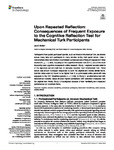Upon Repeated Reflection: Consequences of Frequent Exposure to the Cognitive Reflection Test for Mechanical Turk Participants
| dc.contributor.author | Woike, Jan Kristian | |
| dc.date.accessioned | 2020-10-14T19:20:11Z | |
| dc.date.available | 2020-10-14T19:20:11Z | |
| dc.date.issued | 2019-12-06 | |
| dc.identifier.issn | 1664-1078 | |
| dc.identifier.issn | 1664-1078 | |
| dc.identifier.uri | http://hdl.handle.net/10026.1/16539 | |
| dc.description.abstract |
Participants from public participant panels, such as Amazon Mechanical Turk, are shared across many labs and participate in many studies during their panel tenure. Here, I demonstrate direct and indirect downstream consequences of frequent exposure in three studies (N 1-3 = 3, 660), focusing on the cognitive reflection test (CRT), one of the most frequently used cognitive measures in online research. Study 1 explored several variants of the signature bat-and-ball item in samples recruited from Mechanical Turk. Panel tenure was shown to impact responses to both the original and merely similar items. Solution rates were not found to be higher than in a commercial online panel with less exposure to the CRT (Qualtrics panels, n = 1, 238). In Study 2, an alternative test with transformed numeric values showed higher correlations with validation measures than the original test. Finally, Study 3 investigated sources of item familiarity and measured performance on novel lure items. | |
| dc.format.extent | 2646- | |
| dc.format.medium | Electronic-eCollection | |
| dc.language | eng | |
| dc.language.iso | en | |
| dc.publisher | Frontiers Media SA | |
| dc.subject | Mechanical Turk (MTurk) | |
| dc.subject | cognitive reflection test (CRT) | |
| dc.subject | online research | |
| dc.subject | practice effects | |
| dc.subject | professional participants | |
| dc.title | Upon Repeated Reflection: Consequences of Frequent Exposure to the Cognitive Reflection Test for Mechanical Turk Participants | |
| dc.type | journal-article | |
| dc.type | Journal Article | |
| plymouth.author-url | https://www.ncbi.nlm.nih.gov/pubmed/31866890 | |
| plymouth.volume | 10 | |
| plymouth.publication-status | Published online | |
| plymouth.journal | Frontiers in Psychology | |
| dc.identifier.doi | 10.3389/fpsyg.2019.02646 | |
| plymouth.organisational-group | /Plymouth | |
| plymouth.organisational-group | /Plymouth/Faculty of Health | |
| plymouth.organisational-group | /Plymouth/Faculty of Health/School of Psychology | |
| plymouth.organisational-group | /Plymouth/REF 2021 Researchers by UoA | |
| plymouth.organisational-group | /Plymouth/REF 2021 Researchers by UoA/UoA04 Psychology, Psychiatry and Neuroscience | |
| plymouth.organisational-group | /Plymouth/REF 2021 Researchers by UoA/UoA04 Psychology, Psychiatry and Neuroscience/UoA04 Psychology, Psychiatry and Neuroscience MANUAL | |
| plymouth.organisational-group | /Plymouth/Users by role | |
| plymouth.organisational-group | /Plymouth/Users by role/Academics | |
| dc.publisher.place | Switzerland | |
| dcterms.dateAccepted | 2019-11-08 | |
| dc.rights.embargodate | 2020-10-16 | |
| dc.identifier.eissn | 1664-1078 | |
| dc.rights.embargoperiod | Not known | |
| rioxxterms.versionofrecord | 10.3389/fpsyg.2019.02646 | |
| rioxxterms.licenseref.uri | http://www.rioxx.net/licenses/all-rights-reserved | |
| rioxxterms.licenseref.startdate | 2019-12-06 | |
| rioxxterms.type | Journal Article/Review |


